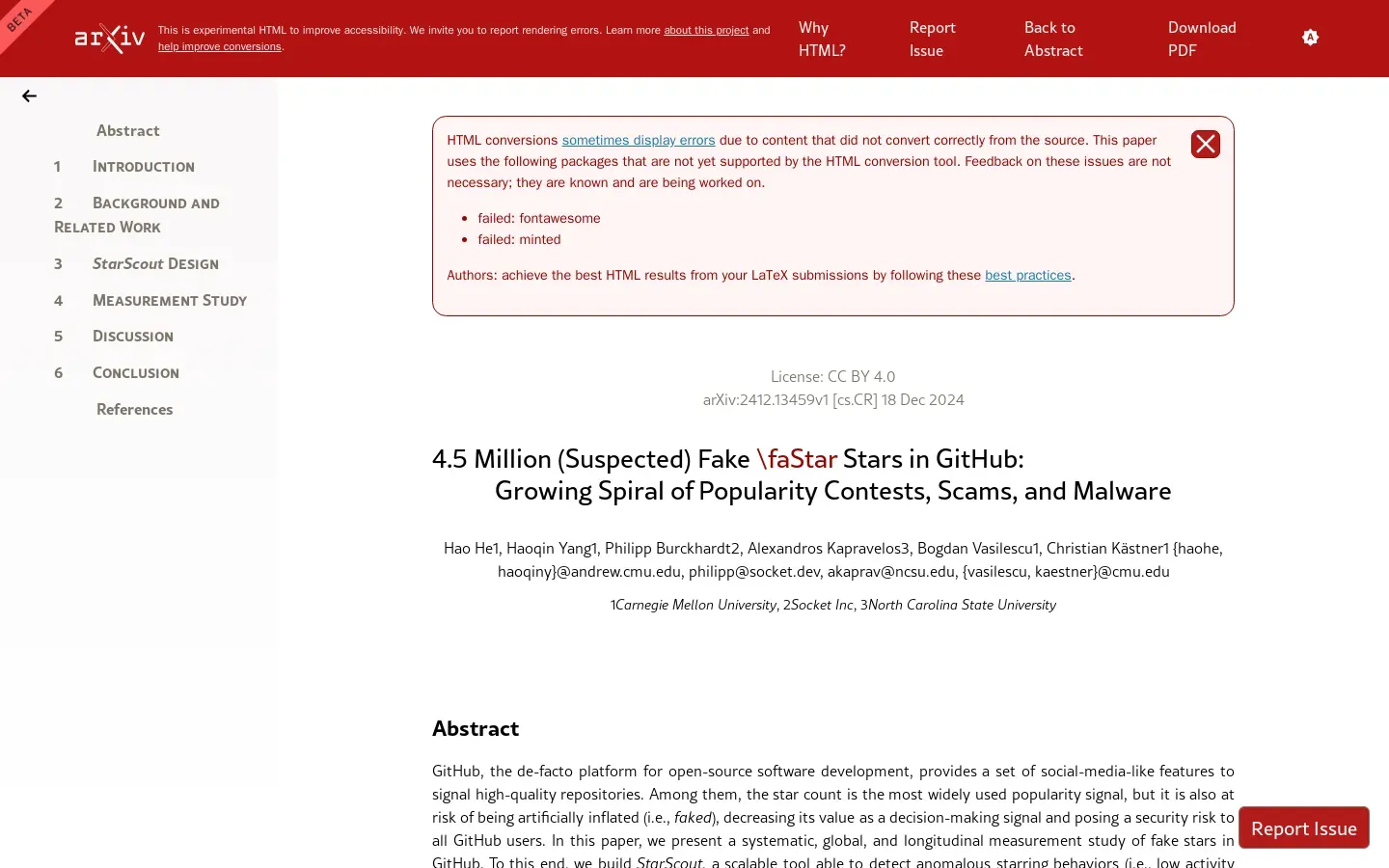
4.5 Million Suspected Fake Stars Identified on GitHub
/ 4 min read
Quick take - A recent study has identified a significant rise in fake star campaigns on GitHub, highlighting their potential risks to software supply chain security and proposing enhanced detection mechanisms to address these threats.
Fast Facts
- Rising Threat: A significant increase in fake star campaigns on GitHub poses risks to software supply chain security, affecting repository integrity and metrics.
- Detection Tools: The study introduces advanced detection mechanisms, such as the StarScout tool, for real-time monitoring of fraudulent activities in CI/CD pipelines.
- User Behavior Insights: Analysis of GitHub accounts involved in fake star campaigns reveals distinct characteristics, aiding in the identification of fraudulent users.
- Ethical Concerns: The research emphasizes the importance of responsible data interpretation to prevent reputational harm to repositories falsely identified as fraudulent.
- Future Directions: Recommendations include collaboration with cybersecurity firms, community education initiatives, and longitudinal studies to better understand and combat fake star trends.
Research Unveils Growing Threat of Fake Stars on GitHub: Implications for Software Supply Chain Security
In a groundbreaking study published in late 2023, researchers have delved into the burgeoning issue of fake stars on GitHub, uncovering alarming trends that pose significant risks to software supply chain security. The research aims to illuminate the prevalence and characteristics of fake star campaigns, assess their impact on repository reputation, and propose enhanced detection mechanisms to mitigate these threats.
Objectives and Methodology
The primary objective of the study was to investigate the extent of fake star campaigns on GitHub and their implications for cybersecurity. Researchers employed a multifaceted methodology that included descriptive analysis of repositories, user behavior analysis, and the development of advanced detection tools such as the StarScout tool. They meticulously analyzed repositories that received over 50 fake stars in a single month, with fake stars constituting more than 50% of their total stars. Additionally, they focused on repositories with an all-time percentage of fake stars exceeding 10%, revealing a troubling trend that has escalated significantly in 2024.
Key Findings and Tools
The research unearthed several crucial findings:
-
Prevalence of Fake Stars: A significant increase in fake star campaigns was observed, raising concerns about the integrity of repository metrics and the potential for manipulation within the open-source ecosystem.
-
Enhanced Detection Mechanisms: The study proposed the integration of enhanced detection tools within Continuous Integration/Continuous Deployment (CI/CD) pipelines, allowing for real-time monitoring and identification of fraudulent activities.
-
User Behavior Analysis: By examining the characteristics of GitHub accounts involved in fake star campaigns, researchers were able to differentiate these accounts from typical users, providing insights into the underlying dynamics of such fraudulent activities.
-
Ethical Considerations: The research highlighted the ethical implications of using datasets with inaccuracies, stressing the importance of responsible interpretation to avoid reputational harm to falsely identified repositories.
Implications for Cybersecurity
The implications of these findings are manifold. Firstly, they underscore the necessity for enhanced detection of malicious repositories, which can significantly compromise software supply chains. Secondly, the integration of trust metrics in software supply chains is imperative to ensure the reliability of open-source projects. This research also calls for policy recommendations for platform moderation and community awareness initiatives to educate open-source practitioners about the risks associated with fake stars.
Strengths and Future Directions
The strengths of this research lie in its comprehensive approach, utilizing a variety of tools and frameworks to analyze the dynamics of fake stars on GitHub. The study’s findings contribute to a deeper understanding of the complexities involved in evaluating open-source projects, emphasizing the need for more reliable metrics and models for assessing their value and risks.
Looking ahead, the researchers propose several future directions, including:
- Collaboration with Cybersecurity Firms: Establishing partnerships for real-time monitoring of fake star campaigns.
- Community Engagement: Initiating educational initiatives for open-source practitioners to foster awareness of the potential for manipulation within the ecosystem.
- Longitudinal Studies: Utilizing panel autoregression models for a more in-depth analysis of trends over time.
Conclusion
As the landscape of open-source software continues to evolve, the research on fake stars serves as a clarion call for increased vigilance and proactive measures to safeguard the integrity of software supply chains. By understanding the dynamics of fake stars and implementing enhanced detection mechanisms, the open-source community can better navigate the challenges posed by these emerging threats. The study not only sheds light on a pressing issue but also lays the groundwork for a more secure and trustworthy software development environment.



